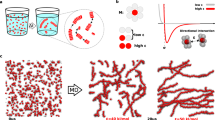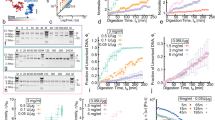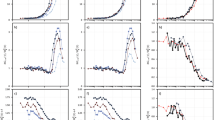Abstract
The dynamic properties of concentrated solutions and melts of linear polymers are reasonably well understood in terms of the reptation concept, whereby molecules are constrained to curvilinear motion within ‘tubes’ formed by entanglements with their neighbours1–3. Understanding of dynamics of entangled nonlinear polymers, however, is still rather limited. Reptation in such cases is expected to be strongly suppressed, but there is little direct evidence for this, and conflicting models have been proposed4–6. We report here a critical study of the diffusion coefficient D of a series of model linear and three-arm star-branched polymers, diffusing in an entangled linear polymer melt matrix, designed to elucidate dynamic mechanisms for the entangled stars. Measuring D as a function of diffusant degree of polymerization N we find, for the linear molecules, D ∝ N−2, as expected for purely reptative motion1,7–9. For the case of moderately short stars, however, D falls considerably faster than an inverse square power law, and is well fitted by an exponential type relation D ∝ e−αN. There is evidence that for the longest stars used in the present study it is the release of entanglements by reptation of the linear matrix molecules which dominates the dynamics. This is the first direct indication of such ‘tube-renewal’ effects in a system of entangled polymers8.
This is a preview of subscription content, access via your institution
Access options
Subscribe to this journal
Receive 51 print issues and online access
$199.00 per year
only $3.90 per issue
Buy this article
- Purchase on Springer Link
- Instant access to full article PDF
Prices may be subject to local taxes which are calculated during checkout
Similar content being viewed by others
References
de Gennes, P. G. J. chem. Phys. 55, 572–579 (1971).
Doi, M. & Edwards, S. F. JCS Faraday II 74, 1789–1801 (1978).
Ferry, J. D., Viscoelastic Properties of Polymers 3rd edn (Wiley, London, 1980).
de Gennes, P. G. J. Phy. 36, 1199–1207 (1975).
Doi, M. & Kuzuu, N. J. polym. Sci. Polym. Lett. 18, 775–780 (1980).
Evans, K. JCS Faraday II 77, 2385–2399 (1981); J. polym. Sci. Polym. Lett. 20, 103–108 (1982).
Kimmich, R. & Bachus, R. Colloid Polym. Sci. 260, 911–936 (1982).
Klein, J. Macromolecules 11, 852–858 (1978).
Klein, J. & Briscoe, B. J., Proc. R. Soc. A365, 53–71 (1979).
Bauer, B. J. & Fetters, L. J. Rubber Rev. 51, 406–465 (1978).
Rachapudy, H., Smith, G. G., Raju, V. R. & Graessley, W. W. J. polym. Sci. Phys. 17, 1211–1222 (1979).
Klein, J., Am. chem. soc. Polym. Reprints 22, 105–106 (1981); Phil. Mag. A43, 771–778 (1981).
Author information
Authors and Affiliations
Rights and permissions
About this article
Cite this article
Klein, J., Fletcher, D. & Fetters, L. Diffusional behaviour of entangled star polymers. Nature 304, 526–527 (1983). https://doi.org/10.1038/304526a0
Received:
Accepted:
Issue Date:
DOI: https://doi.org/10.1038/304526a0
This article is cited by
-
Superlubricity achieved with two-dimensional nano-additives to liquid lubricants
Friction (2020)
-
The computer simulations of polymer dynamics in porous media
Rheologica Acta (2006)
-
Effect of number of arms on diffusion of star polymers
Nature (1990)
-
Self-diffusion of polystyrene in solution 2. Discussion of experimental results on the basis of the reptation mechanism and entanglements
Colloid & Polymer Science (1988)
-
The chain length dependence of self-diffusion in melts of polyethylene and polystyrene
Colloid & Polymer Science (1987)
Comments
By submitting a comment you agree to abide by our Terms and Community Guidelines. If you find something abusive or that does not comply with our terms or guidelines please flag it as inappropriate.



